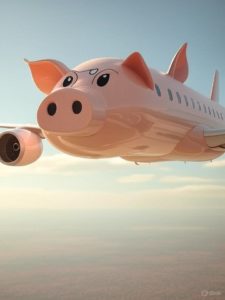 Pigs may not be able to fly, but their poop could help power planes in the future as a Kansas State University engineer is researching the production of aviation fuel precursors from swine waste.
Pigs may not be able to fly, but their poop could help power planes in the future as a Kansas State University engineer is researching the production of aviation fuel precursors from swine waste.
The project focuses on anaerobic membrane reactors, or AnMBRs, as a viable platform to recover and valorize swine waste streams through co-fermentation into short- and medium-chain organic acids, which ultimately can be transformed into synthetic aviation fuel.
Prathap Parameswaran, recipient of the Fornelli Engineering Professorship and associate professor of civil engineering in K-State’s Carl R. Ice College of Engineering, received a more than $600,000 grant from BioMADE, a Manufacturing Innovation Institute sponsored by the U.S. Department of Defense. Parameswaran will collaborate on the project with Iowa State University, which is leading the project, and Quasar Energy Group.
“Our role in this project is to validate the use of anaerobic membrane reactors as a platform for transforming these waste products, including fats, oils and greases, into biomanufactured aviation fuel precursors,” Parameswaran said. “We are essentially running pilot-scale production of this novel technology, while conducting the vital research and development to validate its versatility and scalability.”
The fuel precursors being created by Parameswaran’s team will be separated and purified before being transformed into synthetic aviation fuel by ketonization and hydrodeoxygenation processes.
“Synthetic aviation fuels are a strategic resource for the U.S. Department of Defense,” Parameswaran said. “While there are other ways to turn waste into fuel, many rely on federal incentives or are inefficient. Use of anaerobic membrane reactors shows real potential as a promising platform, it just needs to be piloted effectively.”

